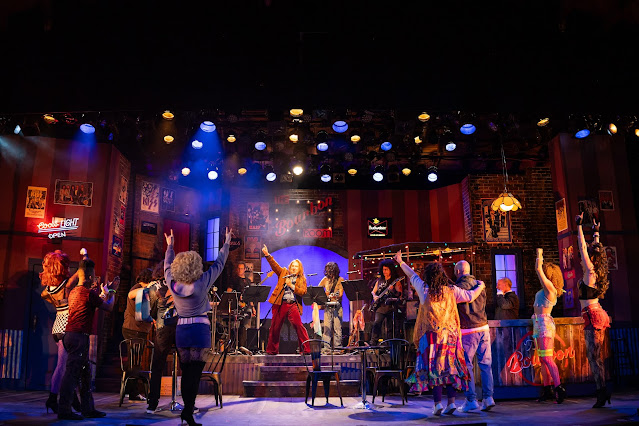The Summer Theatre of New Canaan’s staging of Mary Poppins is their best production in years. Every aspect of the show comes together to form a charming, entertaining theatrical experience. At the matinee I attended, the audience was teeming with hardcore critics - young children - who were attentive and entranced throughout the production.

Emily
Grace Tucker as the title character in Mary Poppins.
Mary Poppins is one of the longest running musicals in Broadway history (ranked #22) and based on the 1964 Disney film that starred Julie Andrews and Dick Van Dyke. The show, with a book by Julian Fellowes, of Downton Abbey fame, closely follows the movie, with only a few changes that eliminate potential technical difficulties. For example, there is no floating revelry at the top of a ceiling or jaunty excursion into Bert’s sidewalk drawings. However, there is no shortage of fun and frolicking. Mary Poppins does fly, ramrod straight, umbrella in hand. The song “Supercalifragilisticexpialidocious” now takes place at a buoyant, whimsical Mat Hatter type tea party.
 |
| The cast of Mary Poppins. |
For audience members not familiar with the plot – is that possible – the story unfolds in 1910 London. The young, rambunctious Jane and Michael Banks drive their nannies crazy and are a constant concern for their parents Winifred and George. After another nanny resigns in a huff, Mary Poppins suddenly appears, answering the children’s plea for a playful, humane governess. Through her unorthodox methods, eccentric acquaintances, and unpredictable flights of fancy, Mary brings the family together importance of family.
 |
| Emily
Grace Tucker as Mary Poppins and Stephen Petrovich as Bert in Mary Poppins. |
Director Melody Meitrott Libonati, working with a first-rate cast, weaves a spell of exuberant enchantment. She adeptly incorporates Choreographer Doug Shankman’s high-stepping and spirited dance routines into the production. Most notable is the frisky “Supercalifragilisticexpialidocious” number and the lively chimney sweep shimmies of “Step in Time.” The “Supercalifragilisticexpialidocious” scene is enhanced by Lauren Nicole Sherwood’s imaginative, witty costume designs and wigs. Ms. Libonati quickly moves the scenes laden more with exposition into the thrilling, child-friendly moments. She skillfully integrates Daniel DeGeorges’ scenic design of brightly colored painted curtains and movable set pieces.
The score is populated by iconic songs from the pens of Disney stalwarts Richard M. Sherman and Robert B. Sherman. They include "Chim Chim Cher-ee," "Jolly Holiday," "A Spoonful of Sugar," "Feed the Birds," and "Step in Time." Composer George Stiles and lyricist Anthony Drewe have written additional songs that help expand a character’s persona (“Practically Perfect”) and insert a bit of menace into the show (“Temper, Temper” and "Brimstone and Treacle").

Stephen Petrovich as Bert and members of the cast of Mary Poppins.
The cast is led by Emily Grace Tucker as the unflappable, practically perfect Mary Poppins. The actress commands attention as she leads her charges and brings joy and merriment to everyone she connects with. Ms. Tucker, who possesses a beautiful singing voice, also brings poise and charm to the role. Stephen Petrovich is an ideal Bert. Lanky and elastic, he has a perpetual smile across his face as he sings and dances up a storm. Janelle A. Robinson brings both a lighthearted gaiety and a strong-willed toughness to the roles of Mrs. Corry and the feared Miss Andrews. Sean Hannon (Mr. Banks) and Jazmin Gorsline (Mrs. Banks) provide seasoned adult sensibilities to the production.
Mary Poppins, an ideal introduction, for young and old alike, playing at the Summer Theatre of New Canaan through July 28. Click here for dates, times and ticket information.



















